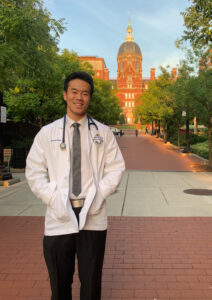Takeaway
Deciding on an area of practice during medical school reminded me to ask for help when needed and to be comfortable with uncertainty. These skills will help me when I care for patients in the future.

Lifelong learning in clinical excellence | May 5, 2022 | 1 min read
By Howard Chang, Medical Student, Johns Hopkins Medicine
Summertime is when most third-year med students who haven’t yet decided on a specialty or area of practice begin to feel the pressure of committing to something. If they haven’t done so already, this is when many students seriously begin to clarify their goals for the future, do honest self-reflection and introspection, and seek advice from mentors. While it can be unsettling for undecided students in the months leading up to residency applications, they’re in good company, as it’s common for students to make late changes or decisions based on new information or revelations.
When I started med school, I thought I knew with certainty that one specific specialty was my calling. I had even intentionally applied to med school dreaming of what my day-to-day life would look like in this practice setting. Recently, however, I discovered that I was better suited for a different area of practice altogether. It was initially alarming to realize that I’d be pivoting away from the career I always thought I wanted and toward something I’d never previously considered. But after the dust settled, I recognized some important lessons that we can take to heart during the career decision-making process—lessons that are clinically applicable and which can ultimately make us better healthcare professionals:
1. The process of deciding on one direction in the presence of multiple viable options helps us uncover what we truly value, and why.
2. Facing the unknown and uncontrollable future reminds us that we’re human, and therefore to always be humble and willing to ask for help.
3. Executing big adjustments in light of new information forces us out of rigid patterns of thought and behavior and makes us adaptable to evolving circumstances.
4. Deciding on a course of action even in the presence of much doubt trains us to be more comfortable with uncertainty and less paralyzed by fear.
5. Having multiple good options reminds us that there isn’t always one perfect answer, and that each option carries specific advantages and disadvantages.
This piece expresses the views solely of the author. It does not necessarily represent the views of any organization, including Johns Hopkins Medicine.

